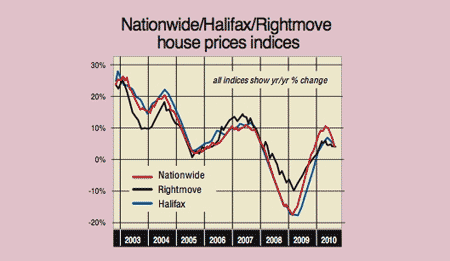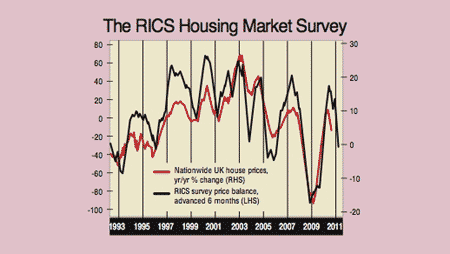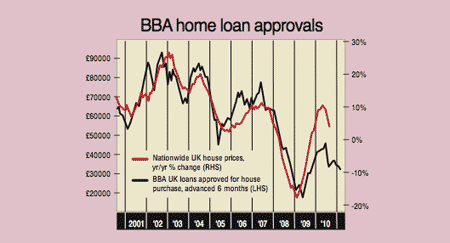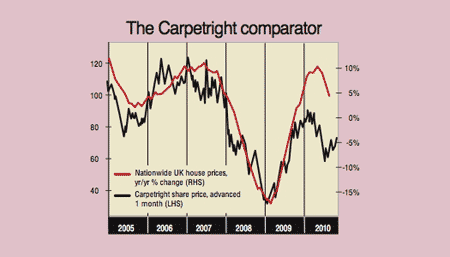What next for Britain's property prices?
Merryn Somerset Webb asks MoneyWeek's panel of experts where they think Britain's property market - and house prices - are likely to be headed in the coming year.

Get the latest financial news, insights and expert analysis from our award-winning MoneyWeek team, to help you understand what really matters when it comes to your finances.
You are now subscribed
Your newsletter sign-up was successful
Want to add more newsletters?

Twice daily
MoneyWeek
Get the latest financial news, insights and expert analysis from our award-winning MoneyWeek team, to help you understand what really matters when it comes to your finances.

Four times a week
Look After My Bills
Sign up to our free money-saving newsletter, filled with the latest news and expert advice to help you find the best tips and deals for managing your bills. Start saving today!
Merryn Somerset Webb asks MoneyWeek's panel of experts what they think will happen to the property market in the coming year.
Merryn Somerset Webb: Stuart, when we met last year we were all bearish except you. And according to the house-price indices, you were the one who was right. What has happened since?
Stuart Law: I was right purely because I read the data which were already showing a bounce. And I could see active buyers coming in, people risking real money and making considered judgements. Not speculators investors. We also didn't believe the hype. James [Ferguson] said we were going to see LIBOR [the inter-bank interest rate against which many mortgages are priced] going through the roof. We thought that was a threat, but one that would be neutralised. Had it not been, this country would have failed to exist; our banks would have failed to exist. What underpins all the banks to a significant level is the value of real estate. So the Bank of England had to sort it out. What would the Bank of England do if the stockmarket was going to halve in price tomorrow? Absolutely nothing. And what would it do if housing was going to halve tomorrow? Absolutely anything in its power because it would kill the country if it happened.
MoneyWeek
Subscribe to MoneyWeek today and get your first six magazine issues absolutely FREE

Sign up to Money Morning
Don't miss the latest investment and personal finances news, market analysis, plus money-saving tips with our free twice-daily newsletter
Don't miss the latest investment and personal finances news, market analysis, plus money-saving tips with our free twice-daily newsletter
Merryn: So you think the bail-out of the banks, along with ultra-low interest rates, worked?
Stuart: In the short term it has. Now the argument is whether it can continue working in the medium term over the next five years. That's the uncertain bit. It is obvious where the market will be in ten or 20 years' time.
Merryn: Is it?
Stuart: Britain is a closed-shores market with limited supply. Thanks to lack of funding we aren't going to see any real supply of new housing. But demand is rising. The immigrants didn't go home and all the evidence is that the population is rising faster. So, no matter what the short-term issues are with finance and sentiment, in terms of the big picture, the ten to 20-year view is rock solid.
Merryn: OK. And the five-year view?
Stuart: It is down to how we manage things.
Ed Mead: How the market is in five or ten years depends on how you define a good market. You talk about prices. For me, a good market is about volumes, which are catastrophic at the moment. It's down and it's not going to change for five years, ten years.
Merryn: Why have volumes fallen so much, Ed?
Ed: In London, we've seen a big change in the demographic a lot of foreigners buying. Foreigners tend to buy for at least a generation that reduces supply and stamp duty. Across Greater London the average house price is, what, £300,000? So you pay £9,000 just to move. Add the cost of your agent, and so on, and you are talking about 7% or 8% in costs simply to move. That's too much for most people.
Merryn: So you think it's the up-front cost rather than the mortgage famine?
Ed: In London the market I know people tend to have access to money, so it is not so much about mortgages.
Stuart: If you're not an estate agent, what does it matter if transactions have fallen?
Henry Pryor: Prices will fall as a result. House prices are based on people's ability to be able to borrow the money to fund the purchase. Right now, only about 8% of the available stock for sale is selling. Go almost anywhere in the country and you can't move for forests of 'For Sale' boards pretty much anybody can go in and name their price. There are 960,000 houses on the market today that's 120,000 more than at this time last year. And let's not forget that estate agents make their money from volume more than price. So they are now likely to be leaning on vendors to get deals done. They can't squeeze more money out of buyers, so it has to be sellers who give.

Stuart: We keep saying that demand isn't real because not everyone who wants a house can get a mortgage. But supply isn't real either. Just because you put your house on the market doesn't mean you are going to sell it, especially if it means taking a hit.
Henry: I take Stuart's point that just because you've instructed an agent doesn't actually mean it's an enthusiastic sale. But the fact that there are many houses that are really for sale is witnessed by the fact that about 30% of houses had a re-evaluation over the summer and have hit the market now with a lower guide price. There are 10,000 estate agents out there who need to work to drive down prices in order to get transactions up and survive.
Ed: I'll give you an example of what Stuart is talking about. Post-Lehman, the market dropped quite substantially. One of my colleagues got three good offers on three houses. They went to the owners and said: "Here you are, three good offers what do you want to do?" All three withdrew the properties from the market because they were sitting on so much equity that they weren't selling unless they got the price they wanted. And with the cost of debt so low they can do that. Don't forget, there is a two-tier market. For those who have got money and access to money, and can access the cheap mortgages, it's never been better. If you've got a job and you've got access to borrowing, it's fantastic as long as you can find forced or pressured sellers, because they are the only ones who will transact.
James Wyatt: I know quite a few people out there at the moment who are thinking that if they sell now they can do well out of trading up. One point to be clear on is that in a falling market there are three times as many winners as there are losers. The first-time buyer is a winner (if they can buy), as is the second-time buyer who can trade up to a new house at a lower differential. The only losers are the down-sizers. So pensioners are being hammered. Their annuity rates are falling as are their investment yields and now it looks like the value of their houses will fall.
Stuart: We don't yet know prices are going to fall again. Look at a chart combining all of the main indices Rightmove, Halifax, Nationwide, Land Registry this is the thing we used to forecast the sustained 17-month bounce in the market. Everybody else said it was a one-month blip. We've had a couple of months where we have glitched back, but we are still in an uptrend. Right now prices are only 6.5% off peak that's it.
Merryn: And where are they going next?
Stuart: Well, prices couldn't have carried on rising that fast. The fact that prices went down 17% in the first place was due to there suddenly being real forced sellers. Once they had been cleared, things began to move back fast. Most people did not want to sell at those prices.
James Wyatt: You do need a willing vendor for transactions to take off. And there have been academic studies that show there is price stickiness going down. Even now many sellers are just testing the market.
Merryn: But if people don't want to sell, why are they putting their houses on the market? Think of all the couples you know where the woman wants to move house for some reason or other and the man says we are not moving because the price isn't this and the price isn't that. The woman always wins. So all these people testing the market, in the end, for the sake of their families, their lifestyles, whatever it is, they will sell and move. It is just a matter of time.
Special FREE report from MoneyWeek magazine: Don't be fooled - house prices will fall again!
- Why UK property prices are set to collapse by 30%
- When it will be time to get back in and buy up dirt cheap property
James: In the early/mid-1990s I can remember a lot of properties sitting on the market for 18 months to two years. But they did sell. However, there is something in the idea that transactions will be much lower from now on. In 1997 people moved on average every seven to nine years. In 2009 it was every 15 years. Everyone on my street and the surrounding streets has built out and up and also dug down. But they haven't moved. It's too expensive and you can't mortgage your transaction costs.
Ed: Say you are selling a house. You sit there with it on the market at too high a price. You might think the agent will do anything to get the price down and the place sold. But he is also terrified of losing the instruction. So how long do they wait before they cut?
Henry: Not that long. Look at how many July houses are on now at a lower price: 30%. We also know that average asking prices are £61,000 higher than average sale prices. An extraordinary gap. But it looks like the market is getting real now. What we don't know, and I am working on figuring out, is how many of the houses that were on the market in July have come back on with another agent.
Ed: You are saying that one third of all property that was on the market in July is now at a reduced price? I can't believe that.
Merryn: James, you've been very quiet.
James Ferguson: I find it very hard to change my view that prices will fall hard. The thing that's changed dramatically in the last few years, of course, is interest rates. And I agree, I don't see interest rates going up for quite some time. But I don't see them going up for quite some time for bad, rather than good reasons, namely, massive debt deleveraging. We have a full-scale banking crisis still going on; the banks are stuffed up the ying-yang with hidden bad losses, and we know that banks in that situation always contract lending. So net mortgage lending in the UK is just a tiny bit above zero. We've got the lowest base rates for 340 years and we've got a second round of quantitative easing coming up. But quantitative easing round one was equivalent to 14% of GDP and yet we only managed broad-money growth of 1%. If we didn't have Mervyn King doing his damndest to make sure that we appeared to be living OK, we'd be Ireland. And on house prices, we know that one thing that makes house prices go up is mortgage rates going down. So we lowered mortgage rates from the 7% range to the 4% range. Yet prices are not back at anything like what they were even at their peak, so we've done very little given the fact we have shot the most important bolt.
Stuart: Well, we were 17% off and we are now 6% off peak.
James F: Yes, but with rates this low, prices should have doubled. And the transaction point is important. If you want to get prices up you lower the cost of transaction if you want to get prices down you increase it to make it harder to buy. In the last decade house prices kept going up even as we raised transaction costs, all down to the amazing momentum they had. Now we are seeing the effects. Buyers aren't interested and the only reason prices haven't come down is because of low interest rates. But with interest rates at a 340-year low, it's almost impossible to imagine they are going to go anywhere other than up in the end.
Merryn: How much will house prices have fallen in five years, James?
James F: The question is whether house prices will stay flat in nominal terms and wait for value to catch up, or whether they will actually fall. It is usually the latter, but this time the authorities are playing a completely new game with rates a tenth of what they would be at in a normal environment. So I think the chances of prices waiting a decade for value to catch up is much higher.
However, I don't think that's what's going to happen. We used to think that in year one transactions would collapse and in year two prices would follow. But two years in, sellers haven't had to get real because interest rates are so low and because we've had a much smaller drop in unemployment than expected. So far. However, with austerity measures coming through, that's going to change.
It is also true that when people die their houses have to be sold off. Perhaps we'll end up with the whole country being like Mayfair, where no one ever moves again. But that's unlikely. So we do need buyers. What the Bank has done (buying people time by letting them sit on their properties with low interest rates rather than sell) is not the same thing as encouraging buyers. Who breaks first? I think it's obvious: it's the sellers. They'll eventually have to sell, whereas buyers can never suddenly be able to buy.
Merryn: And a number?
James F: Five years down 30% in real terms. But as there won't be any inflation, real and nominal are the same thing.
James W: I agree with a lot of what James says. The best-case scenario is stasis. But there is nothing driving the economy and too much scope for black swans for that to happen something nasty in North Korea, China, or America, say. If you look at house prices to earnings ratios we are 20%-25% over trend. So we could see a fall of 20%-25% plus.
Stuart: The one thing the government needs to protect is the economy. But in driving the economy forwards one way or the other, they are categorically going to create the seeds of the next asset bubble, and that includes property. They're going to find it hard to separate the incentives to drive the economy, the economic growth, away from things that will drive assets, particularly investment assets. A property buyer, in today's market, is a real investor. There are no savings returns and people are beginning to see the stability of the British residential system. Does it really matter what happens in one, two, three, four, five years? If they can buy a residential property, with insatiable demand to live in it on a rental basis, giving them already 6% yield with a potential to grow at 5% plus a year? The yield tells you where the value is and you are getting a great income.
James W: Doesn't a high yield just tell you that you're going to have trouble getting your rent?
Stuart: No, it tells you where the value will grow in the future. Obviously, there are some mistakes you could make, but you can buy true rental income driven by genuine demand. We've seen two quarters now from the Royal Institution of Chartered Surveyors on rental growth and it's the beginning of a decade of a rental boom. People won't be able to buy and it will be horrifying how unaffordable rental housing will be.
Merryn: So where will people live?
Stuart: In rental houses. They will just stop buying fancy handbags and hand the money over to landlords instead. If rents are going up by 5%-10% a year for the next few years then slowing down a bit, that will support house-price growth.
James W: I think rental yields are going up too. But that's because house prices are going down.
Merryn: Can you give us a number?
Stuart: Our generic long-term view has always been about 5% a year even in these conditions. Now I'd moderate that to 4% compound, or 21.5% in five years. The one major threat to this might be the FSA's new affordability criteria, which will make the mortgage market even tougher.
Merryn: OK, so where will prices be in a year?
James F: Down 5%.
James W: Down 5% to 10%.
Stuart: Up 4%.
Henry: Down 9%.
Ed: Down 5%.
What's the latest on house prices?

The annual change in prices, as measured by the Halifax, Nationwide (sales prices), and Rightmove (asking prices) indices.
Halifax: current price £168,889 (16% off peak); Nationwide: £166,757 (10.4%); Rightmove: £229,767 (4.9%).
Where are prices heading next?

Each month, the Royal Institution of Chartered Surveyors (RICS) asks surveyors and agents where they think prices are heading. It's a good lead indicator. This chart shows how the RICS result tends to lead the Nationwide house price index by about six months.
What mortgage approvals are saying

The British Bankers' Association covers about 70% of gross mortgage lending in Britain. So its monthly tally of 'loans approved for house purchase' is a good guide to housing market activity and the outlook for prices as this chart shows.
The Carpetright house price indicator

Carpetright is Europe's top specialist floor-covering retailer. So its stock price is a good guide to activity in the market when people move, they often buy new flooring. Again, this also proves to be a good indicator for future moves in house prices.
This article was originally published in MoneyWeek magazine issue number 507 on 8 October 2010, and was available exclusively to magazine subscribers. To read more articles like this, ensure you don't miss a thing, and get instant access to all our premium content, subscribe to MoneyWeek magazine now and get your first three issues free.
Get the latest financial news, insights and expert analysis from our award-winning MoneyWeek team, to help you understand what really matters when it comes to your finances.

-
 UK interest rates live: rates held at 3.75%
UK interest rates live: rates held at 3.75%The Bank of England’s Monetary Policy Committee (MPC) met today to decide UK interest rates, and voted to hold rates at their current level
-
 MoneyWeek Talks: The funds to choose in 2026
MoneyWeek Talks: The funds to choose in 2026Podcast Fidelity's Tom Stevenson reveals his top three funds for 2026 for your ISA or self-invested personal pension